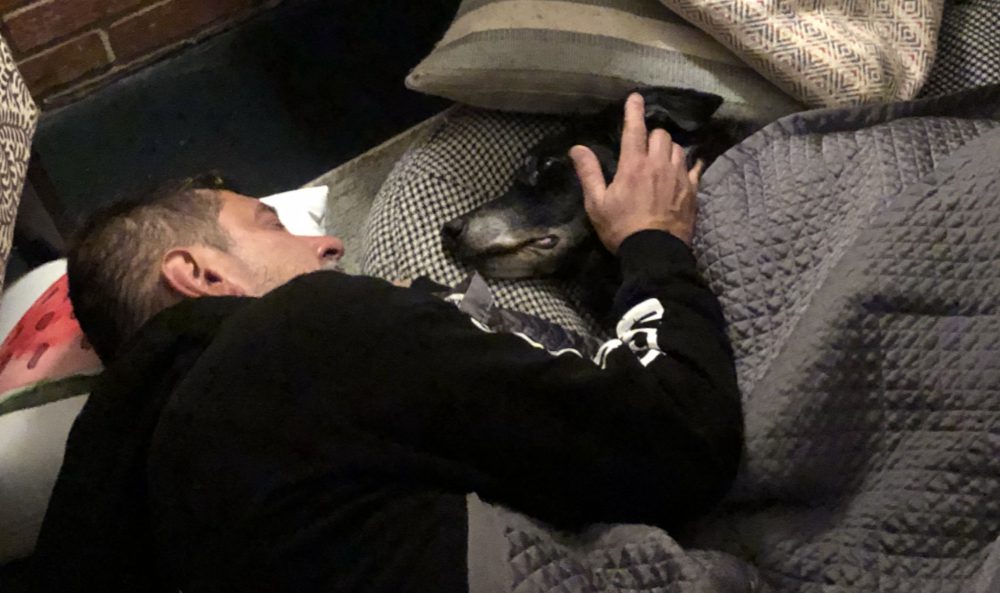Losing a dog is the most difficult day in the life of a dog owner. It can be hard to know how to cope with the loss of a pet, but there are many ways that you can process your grief and find peace.
Just know the loss of your dog may result in a variety of emotions: denial, guilt, anger, sadness, shock, or pain. To move forward, it is important to deal with these emotions following the death of your dog.
It is crucial to remember that people respond differently to the loss of a dog and any given person (including your) may experience all or none of these emotions. If multiple people live in your home, respect the feelings of other family members. Recognize that each family member may share a different level of bond with the pet, as well as grieve differently.
Grief
“Grief is like the ocean, it comes in waves, ebbing and flowing. Sometimes the water is calm, and sometimes it is overwhelming. All we can do is learn to swim.”
~ Vicki Harrison
Grief is a healthy and normal response to loss. Coping with grief is an individual journey of healing. What works for some, may not work for all. Grief can feel like being lost. The familiar things we relied on to live each day are gone. We must find new anchors or stabilizers along the way and learn a new way of relating to the world and people around us. This can be especially true when a companion pet was heavily integrated into our daily routines. It is common to replay the last moments of your dog’s life repeatedly in your mind, as a video playing the same scene over and over.
What can make the experience of pet loss different from other losses is that it is considered a form of disenfranchised grief. This means society still doesn’t recognize it as a ‘valid’ form of grief when compared to the loss of a human life, which means the social support one would normally expect during such a difficult time may not be as readily available. Your loss is valid and so is your grief.
No one can rush the process or provide a magic cure for grief. When grief is new, it is common
to feel exhausted: physically, emotionally and spiritually. Changes in appetite, sleeping patterns or health are frequently reported. Those who are grieving often describe feelings of being out of control, isolated and lonely. Things that seemed so important before now may seem trivial. Others may experience a sense of “life isn’t fair” or being in a tunnel or fog, while everyday life swirls around them.
All of these feelings are normal and part of the grieving process. Grief follows no organized plan, formula or schedule. You may start to feel better, and then feel as if a wave has hit you. There will be ups and downs in the process of grieving.
The purpose of healthy grieving is not to “get over” the death of a loved one, but to integrate the experience of loss into present life in a functional and healthy way. In this process, it is not unusual for certain memories of your dog to become blurred. This does not mean you are forgetting your dog or that your love is diminished. The truth is, you will always love this very special member of your family. The hope is, as time goes on, the feelings of sadness will become less difficult, not that you will never miss or forget your dog. Initially, you may be sad to think or talk about your loss. Eventually, the hope is that you will be able to reminisce and even smile or laugh with good memories.
Guilt
Guilt is one of the most common emotions people experience after the death of their dog especially if they had to make the hard decision to put their dog down. It’s normal to find yourself thinking continuously about what you perceive you could have, should have, or would have done to prevent or postpone your pet’s death.
Some suggestions for coping with guilt include:
- Be truthful with yourself about why you feel guilty.
- Do a reality check. Most people assume that if they had done something differently, the outcome would have been better. It’s just as likely, however, that if you had done things differently, the outcome would have been the same.
- Remember that you are human. No one is perfect.
- Remember that all living things die. There is not always an answer to why bad things happen and you do not need someone or something to blame. Realize that sometimes you are powerless and you cannot control everything that happens to your loved ones. What you can control is how you choose to respond to the events in your life.
- Some owners find it helpful to write an “apology letter” to their pet, expressing the feelings with which they are struggling.
- Try talking to a trusted friend or an advisor about your feelings of guilt. Expressing your emotions in a safe non-judgmental space can help you feel, express, and process your feelings.
Healing your own way
One of the greatest healers is time. Time only heals if you allow yourself to grieve and let yourself feel the emotions that accompany your grief. Afterward, you will be able to make peace with your loss, start to heal and move forward.
Below you will find some practices to consider when in mourning:
- Be kind to yourself. Grieving is an intensely personal process that you should take at your own pace.
- Allow yourself to feel the pain of loss in a safe environment. Give yourself permission to cry. Avoid suppressing intense feelings, so you can heal and start to move forward.
- Talk about your loss to those you trust will understand. This will help process your feelings and help you look at the unique relationship you had with your pet. This may guide you from a place of shock, denial and guilt to a place where you can start to process your grief.
- If possible, avoid people or situations that may prove upsetting. Some people may have never experienced a very special relationship with a pet and may not understand what you’re going through. Minimize contact with those who you know will not understand your loss.
- Read information on pet loss. There are many books and online resources that offer support when grieving.
- Take care of yourself. Incorporate physical activities into your daily schedule to support your sleep and overall well-being. Walks are one of the best forms of exercise. If you have memories associated with walking your dog, take your walks at a different time and place initially. When you feel better you can go back to your previous routine, such as meeting with other pet owners with whom you used to chat.
- Although you may feel some initial resistance, make time to visit friends and family. Try to go out more frequently and on a regular basis. You can still take memories with you and share them, if you choose.
Opening Hours
M-Sa: 10am - 7pm
Address
1111 Central Ave., Charlotte, NC 28204
Phone
844 864 3647


